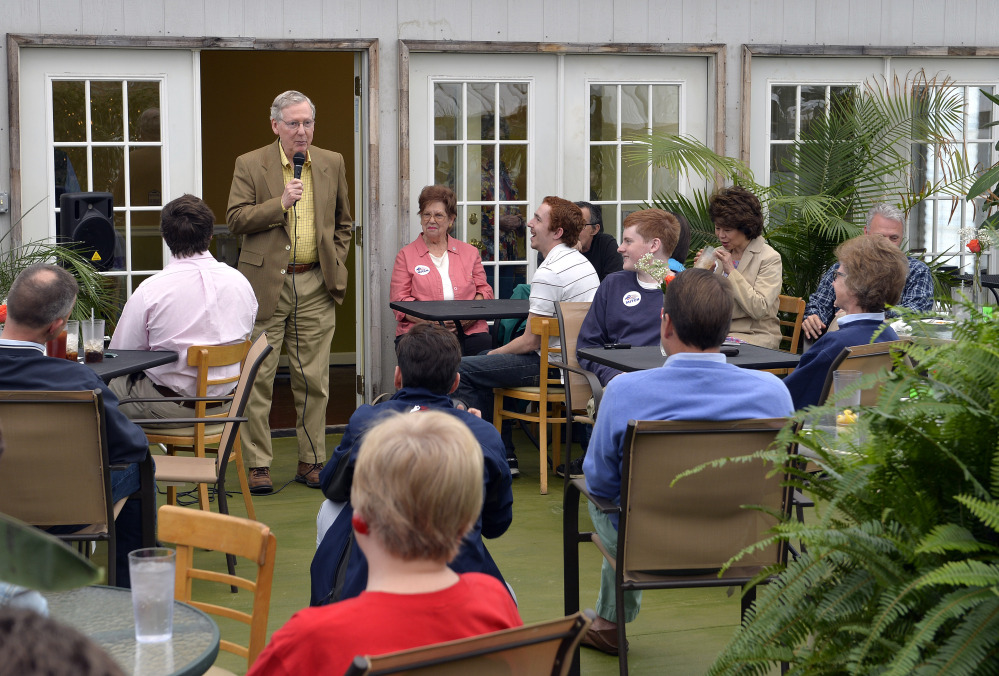ATLANTA — Heading into a busy primary day, Republicans around the country are pleading with voters to turn out in high-profile races that will help determine which party controls the Senate for the final two years of President Barack Obama’s tenure.
And a top Democratic Senate hopeful has her own scrambling to do as she juggles the political realities of Obama’s health care overhaul in a state Republicans control.
In an interview with NBC News leading up to her expected primary victory Tuesday, Georgia’s Michelle Nunn refused to say how she would have voted on the Affordable Care Act if she were a senator in 2010. She later tried to clarify her remarks, but still didn’t answer the question.
Nunn and Kentucky Secretary of State Alison Lundergan Grimes — also expected to win her party’s nomination Tuesday — are Democrats’ best, and perhaps only, shots at picking up Republican-held seats. A Democratic victory in either state would seriously dent Republican hopes of picking up a net of six seats and regaining a Senate majority.
But Nunn will certainly hear about her health care answer once Republicans pick one of seven candidates as their nominee to succeed retiring Sen. Saxby Chambliss. Tuesday’s primary should send the top two finishers on to a July 22 runoff.
Kentucky voters are poised to set up a long-awaited battle between Grimes and Senate Minority Leader Mitch McConnell, who’s favored to dispatch GOP challenger Matt Bevin in an anticlimactic end to what once looked like a threat to the GOP’s top senator.
Senate races also are on the ballot in Arkansas, Idaho and Oregon on Tuesday, and there are primary contests for governor and some congressional seats in Pennsylvania, Arkansas, Idaho, Georgia and Oregon.
The Kentucky and Georgia Senate races have attracted international attention and impressive sums of money. Candidates already have spent more than $32 million, with $26 million by Republicans.
Yet both contests are likely to be settled by a small share of the electorate in a midterm year marked by antipathy toward the president and both parties in Congress.
In her official capacity as secretary of state, Grimes predicted a 30 percent turnout across Kentucky’s two party primaries Tuesday. Only the 1.2 million registered Republicans can vote in the McConnell-Bevin primary.
In Georgia, several of the top Senate candidates said they expected 600,000 or fewer ballots cast, at least 80,000 less than a crowded primary for governor four years ago. Georgia has about 5 million active registered voters who can choose either major party’s ballot in Tuesday’s open primary.
Polls suggest former Secretary of State Karen Handel, Rep. Jack Kingston and businessman David Perdue will battle for two runoff posts. Reps. Paul Broun and Phil Gingrey are also running.
“Voters feel very distrustful right now, and voters are frustrated and angry right now,” Handel said.
Still, she and her fellow Republicans made clear that they want that frustration — particularly with Obama and Senate Majority Leader Harry Reid— to bring loyal Republicans to the polls.
“Voters want a fighter,” Handel said.
Kingston, an 11-term congressman, said, “Voters want a proven conservative.”
In Kentucky, McConnell summoned the same themes to look past the primary. “There’s nothing the president and his allies would like better than to defeat the guy you are looking at,” he said, casting Grimes as a stand-in for Obama.
“She’s able to raise money because she is running against me,” McConnell said. “I’m able to raise money because I am me.”
Grimes and Nunn have tried to frame themselves as centrists and capitalize on voters’ obvious frustrations: Obama’s job approval rating is in the low 40s nationally, and approval for Congress in recent years has consistently been less than half that figure.
Nunn continued those tactics Monday amid a rhetorical dance on Obama’s health care law. After her awkward exchange with NBC News on a hypothetical 2010 vote on health care, her campaign spokesman released a statement that still avoided the question. The candidate later told The Associated Press that she plans on “continuing to answer the question by talking about where we need to go in the future and how we need to move forward.”
Nunn previously has criticized her potential Republican rivals for a “run to extremes,” including in their absolute opposition to the health law. And she’s called for states, including Georgia, to expand Medicaid eligibility under the law. Republican Gov. Nathan Deal, who also faces a primary challenge Tuesday, has refused.
Associated Press writers Christina A. Cassidy in Atlanta and Adam Beam in Frankfort, Kentucky, contributed to this report.
Send questions/comments to the editors.



Comments are no longer available on this story